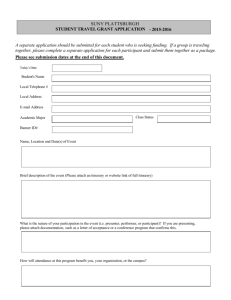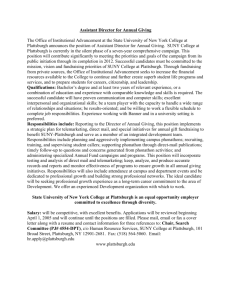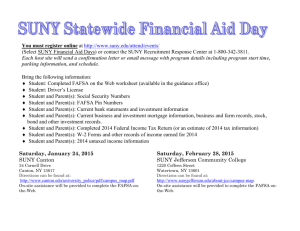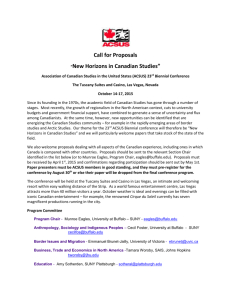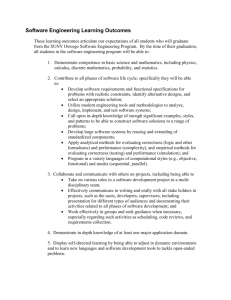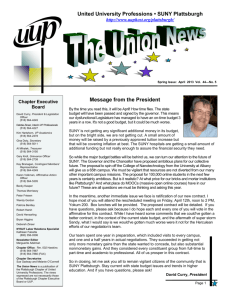Annual Report 10-11_Accounting
advertisement
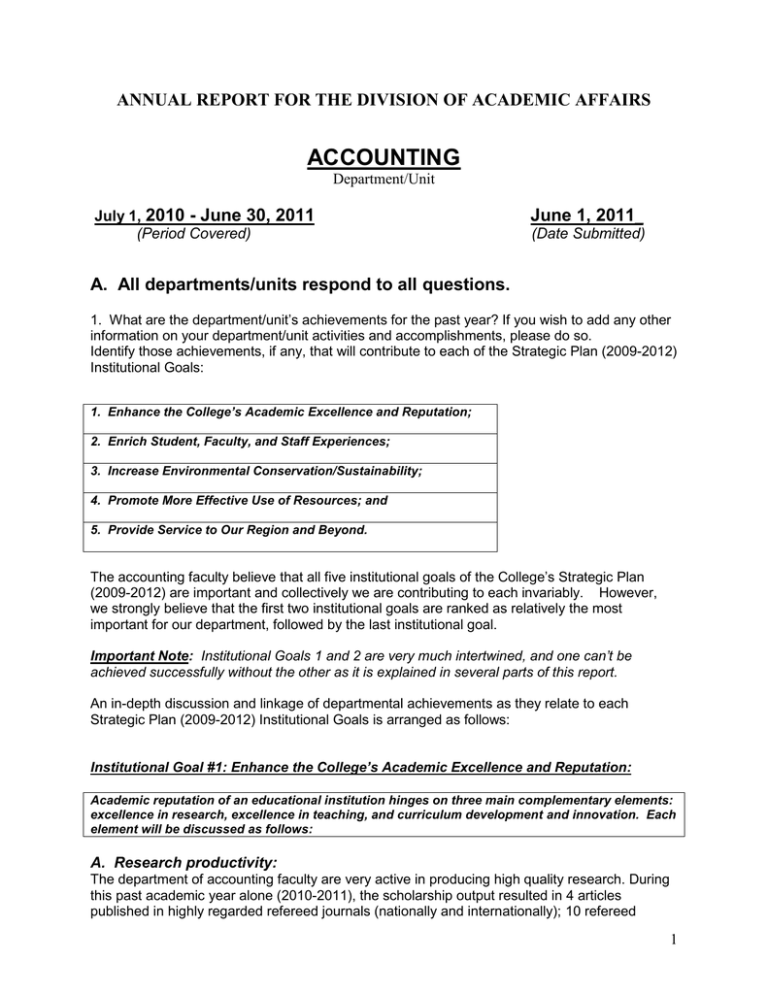
ANNUAL REPORT FOR THE DIVISION OF ACADEMIC AFFAIRS ACCOUNTING Department/Unit July 1, 2010 - June 30, 2011 (Period Covered) June 1, 2011_ (Date Submitted) A. All departments/units respond to all questions. 1. What are the department/unit’s achievements for the past year? If you wish to add any other information on your department/unit activities and accomplishments, please do so. Identify those achievements, if any, that will contribute to each of the Strategic Plan (2009-2012) Institutional Goals: 1. Enhance the College’s Academic Excellence and Reputation; 2. Enrich Student, Faculty, and Staff Experiences; 3. Increase Environmental Conservation/Sustainability; 4. Promote More Effective Use of Resources; and 5. Provide Service to Our Region and Beyond. The accounting faculty believe that all five institutional goals of the College’s Strategic Plan (2009-2012) are important and collectively we are contributing to each invariably. However, we strongly believe that the first two institutional goals are ranked as relatively the most important for our department, followed by the last institutional goal. Important Note: Institutional Goals 1 and 2 are very much intertwined, and one can’t be achieved successfully without the other as it is explained in several parts of this report. An in-depth discussion and linkage of departmental achievements as they relate to each Strategic Plan (2009-2012) Institutional Goals is arranged as follows: Institutional Goal #1: Enhance the College’s Academic Excellence and Reputation: Academic reputation of an educational institution hinges on three main complementary elements: excellence in research, excellence in teaching, and curriculum development and innovation. Each element will be discussed as follows: A. Research productivity: The department of accounting faculty are very active in producing high quality research. During this past academic year alone (2010-2011), the scholarship output resulted in 4 articles published in highly regarded refereed journals (nationally and internationally); 10 refereed 1 presentations at national and international conferences; 2 refereed book chapters; One book; 10 other professional activities; 1 external grant; and 4 book reviews. The future research agenda for the accounting faculty continues to indicate similar trend. It is our assessment, based on publicly accessible records, that scholarship productivity of the Department of Accounting at SUNY Plattsburgh is higher in quantity and quality compared to similar departments within SUNY comprehensive colleges. Summary of the intellectual contribution for 2010-2011 academic-year by accounting by category: Scholarly Activity Category Refereed Articles Refereed Book Chapters Refereed Presentations Books External Grants Book Reviews Other Professional Activities Total items Number 4 2 10 1 1 4 10 32 One accounting faculty is engaged in mentoring Advanced Honor Projects. It has been successfully completed and research results has been presented during Spring 2011. B. Teaching Excellence: (Some of the discussion in this section is also repeated/linked to Institutional Goal #2: Enrich Student, Faculty, and Staff Experiences): 1. Using state of the art technology in teaching several accounting courses such as Accounting Information Systems, Auditing, and Taxation. The Peterson Accounting Lab made it possible to upgrade accounting software packages and professional tax programs. 2. Established an Angel website (soon to be Moodle) for each accounting course to supplement classroom instructions, and to insure instantaneous feedback to students. This in turn allows students to properly prepare for class discussion, and encourage students to visit faculty during their office hours well-prepared to get the help they need. 3. The Accounting faculty are committed to excellence in teaching. We believe in “Partnership in Education “between students and faculty. We insure that the curriculum is updated regularly to reflect the most recent development and advancement in the field of professional accountancy. The Angel website for each course during 2010-2011 academic year includes real-time information and knowledge that most recent textbooks do not have. Ethics is an integral component of each course in accounting starting from the first course in financial accounting and continued to the most advance advanced course in Auditing & Assurance Services. 4. The majority of the accounting faculty consistently use Course Opinion Survey (COS) in each course every semester (on-line) to insure that our student opinions and comments are heard. It gives us feedback on our effectiveness in teaching course instructions. Results of COS along with other means of teaching assessments are discussed in departmental meetings every semester. We encourage and further demand from our accounting students to set highstandard for their educational goals and put themselves in the drivers’ seats in order to succeed in arriving to their final destination and be equipped to build successful career. We explain to students that their collective feedback is a key component in developing and delivering the best accounting curriculum possible. 2 To emphasize the importance of a two-way feedback mechanism, the accounting faculty collectively post the following information on all accounting course syllabi (example is cited below): Feedback to and from students: It is very important for students to get continuous feedback throughout the semester on their individual and team performances from their accounting instructors. It is equally important that accounting instructors get feedback from students on course instruction and materials covered in the curse. Sometimes, an instructor with good intention believes that he/she has provided good feedback to students, however, students may not share the same believes. In order to narrow down the difference on what constitutes feedback from students’ and instructor’s point of views in an accounting course, the department of accounting developed the following list of possible ways that will be used in each accounting course to insure good and timely feedback is provided to each student or group of students: a. Individualized comments/feedback to students from the instructor on each major course assignment. Students are encouraged to reciprocate their comments/feedback to the instructor. b. An Angel website is created for each accounting course. This site will serve as a center for receiving and giving feedback from students to the instructor and from the instructor to students. In addition, the Angel website for the course is useful to students, in that, it will include summary outline of instructor’s lecture notes, PP Presentations when applicable for students review, solutions to selected critical thinking problems in a timely manner, and an interactive practice quizzes. c. Requested meeting(s) may be set when warranted to discuss individual student’s course performance and explain to students the necessary steps to insure their success. A meeting may be initiated by either student or his/her instructor. d. Weekly announcement in class and on Angel course website to encourage students to raise concerns and issues related to course instruction as well as performance related issues e. Insure flexibility of accounting faculty office hours to accommodate individual as well as small group meetings to discuss any issues related to the course content and its related teaching environment. f. Extensive use of the college e-mail system as an additional tool for giving and receiving feedback on all aspects related to the course. C. Curriculum Development and Innovation: The accounting faculty collectively has revamped each course in the accounting curriculum. Our department participated in SUNY initiatives to develop model Syllabi for Introduction to Financial and Managerial Accounting courses for two-year-four-year institution to insure transferability among SUNY two-year and four-year colleges. Also, under the leadership of Professor Ed Lusk, the department changed the ways of teaching Accounting Information Systems, Auditing and assurance services, and Governmental Accounting. Instructor‘s written feedback to students was made instantaneously through Angel course website, and other electronic means. Majority of accounting courses now have an Angel Course Management website, where students could find valuable information and related course review materials, in addition to meaningful feedback on each student course performance from each individual faculty. An important curriculum development is the integration of the IDEA Data Analysis software in Auditing and Assurance Services course. This software is used by many of the CPA firms practicing Auditing and as such it is an empowerment for our students. Needless to say that the development of this integrated model tool is a significant commitment of time on the part of the faculty. Only few schools around the nation use such a program. Last year we presented our System of Delivery of the Statistical component at the National AAA meeting. It was well received. Also, an unsolicited emails from students in ACC402 [2010] were received indicating the GREAT benefits of the practical coverage in Accounting Information System and Auditing. 3 This email was circulated by Dr. Gaber to ALL of the accounting majors. In ACC307 (Governmental Accounting) we have introduced Mid-Week reflections and Group Take Home Quizzes [GTHQs] where we discuss difficult concepts and then have a group take home quiz on these topics. This is working well and there has been a significant amount of discussion that has led to improved performance. Final comment regarding “College’s Reputation: As co-requisites for Excellence in Faculty Scholarship and Teaching is the success of graduates in their professional career development. Our accounting graduates are very successful in landing very rewarding careers and most of them attain their first job before graduation. In the past few academic years, we have almost 100% placement rate for our qualified accounting graduates. Some of them receive job offers before graduation and the rest within the first three-month of their graduating semester. The accounting faculty are instrumental in bringing to campus national and regional CPA firms, business organizations, and governmental agencies to recruit accounting majors. Furthermore, accounting faculty keep close relationship with accounting alumni and record their career achievements. Finally, we genuinely believe that our partnership with accounting students does not dissolve at graduation, rather it continues for so many years in the future (the Assessment Part of the Departmental Annual Report includes detailed information related to students’ achievement). Institutional Goal #2: Enrich Student, Faculty, and Staff Experiences: 1. The department of accounting was successful in recruiting and retaining excellent faculty. This is evident from our recent hires, when we attracted one professor from the Wharton School of Business of the University of Pennsylvania, and a second from Louisiana State University. Both have had very impressive career and well established educational and professional accomplishments, and they are leading the department and the school of business in variety of different areas of knowledge. 2. In order to help faculty in carrying their heavy teaching workload and their extensive research agenda, the department decided to assign a very light advising workload to those faculty who have such agenda to insure that they have enough time devoted to their research projects and teaching responsibilities and helping students succeed academically. 3. The accounting faculty always on the cutting edge in terms of improving course delivery. As explained under the first Institutional Goal, the Peterson Accounting Lab is equipped with professional software packages for students to practice and complete their assignments. Advanced accounting courses use the most recent available technology to enhance classroom instruction. For example, we use QuickBooks in Intermediate Accounting and Accounting Information Systems, The IDEA System -Statistical Software for Auditing and Pro-system FX for the tax program. 4. Accounting faculty are contributing modestly in sponsoring Advanced Honor Projects for highly talented and superb accounting and finance majors. This type of involvement may lead to increase collaborate research productivity between faculty and students. 5. The Department of Accounting faculty have always responded favorably to partnering with two-year sister institutions and any reasonable articulation agreement. In addition, one of our accounting faculty was selected to serve on a SUNY-wide committee to suggest a model course syllabi (including detailed topical coverage) for two introductory accounting courses. The outcome of this committee will make it easy to transfer such courses among all SUNY colleges including community colleges without further evaluation of such courses. 4 6. Accounting faculty are very active in recruitment and retention of highly qualified prospective students. We have taken several approaches to increase the yield each semester. Examples are given below: a) Calling all accepted students; respond to their questions; and explain to them why SUNY Plattsburgh is an excellent choice for their accounting education. b) E-mailing all accepted students with a very short personalized letter telling them who we are and let them know about our accounting graduates’ success stories. c) Full participation of all accounting faculty in open houses and new student orientations. 7. Successful Job Placement for Accounting Graduates. During 2010-2011academic year, thirty-two accounting graduates walked the stage in December 2010 and May 2011. Eighteen of them have already secured jobs before their graduating semester. We do expect the placement ratio will reach 80% in the next few month which is considered a favorable ratio given the current economic conditions. Graduates were placed at CPA firms; business and financial organizations; and medical establishment; governmental agencies and nonprofit organizations including: KPMG (Big-4 CPA), Deloitte (Big-4 CPA), Gallagher & Flynn, McSoley McCoy (CPA),, Grippin, Donlan & Roche, PLC, DeJOy, Knauf, and Blood (CPA), CVPH Medical Center, AliceHyde Medical Center, and IBM. Some of our graduates decided to pursue graduate studies at well-known graduate schools such as: Clarkson University, University at Binghamton, and Syracuse University, among others. The following table is included as an example of placement of accounting graduates (this is a partial list): Name James Charters III Aiako Iwashita Gina Paola Nicole Swanky Satomi Sekine Andrea Kean Wander Morrobel Rebecca Pirofsky Theodore Doherty Mathew Maloney Hao Jiang Year Dec’10 Dec’10 Dec’10 Dec’10 May’11 May’11 May’11 May’11 May’11 May’11 May’11 Name of Employer Gallagher & Flynn Deloitte Crown Point Stewart Stores Deloitte KPMG KPMG Schluter Systems Boulrice, Telling, & Trombley Bombardier Binghamton University-MBA Location Burlington, VT Indianapolis, IN Lake Placid, NY Unknown NYC, NY Burlington, VT Long-Islands, NY Plattsburgh, NY Plattsburgh Plattsburgh/Montreal Binghamton, NY Salary ($) 46,000 47,000 45,000 Bonus ($) 2,000 3,000 NA 55,000 46,000 53,000 36,000 30,000 45,000 NA 5,000 2,000 2,000 NA NA NA NA 8. Success Rate in Passing the CPA Examination of Accounting graduates. Our graduates who joined CPA and other business firms after graduation have been successful in passing all parts of the CPA examination. Here are few names who recently passed all four parts of the CPA examination: Tim Aube (Gallagher & Flynn, CPA Firm in Burlington, VT), Matej Kollar (KPMG – VT), Tameka Walker (KPMG – NY), Brian Piotrowski (Lockheed Martin – Florida), Ralph Underwood (KPMG – Albany), Andy Gola (PriceWaterHouseCoopers, Boston, Mass.), and Walter Fisher (IRS, Plattsburgh, NY), 9. Students Experiential Learning through Field Trips and Internship Opportunities. The Department of Accounting is by far the biggest contributor to the students’ experiential learning. This is done in several ways, among them are: A. Educational Field Trips: 5 Field Trip to the Wall Street Financial District in New York City. Planned and supervised by one of accounting faculty (April 14-16, 2010). Twenty-one students and faculty from the School of Business and Economics joined on this trip. The Educational Trip to Wall Street in New York City included meeting with professionals from Legg/Mason investment banking professionals, and a visit to the largest trading floor in the United Stated headed by one of our alumni, Mr. Tom Skae’81 who is the Managing Director and Vice-President at Night Capital Groups. Such field trips were done annually to enrich our students’ experiences while they are in college and to have taste of real world experience. It is also a networking opportunity with alumni in areas such as New City and Boston. B. Experiential Learning through Internship: Experiential Learning for accounting majors is an absolute necessity. The department of accounting under the guidance of the Internship Office was successful in placing more than 35 accounting majors at different accounting and business firms. The School of Business & Economics as well as the college Strategic Plan is also emphasizing experiential learning. In no other field within business disciplines, experiential learning comes more valuable than the field of accounting. Over the years, we continue our partnership with local, regional, and national CPA firms, not only in the North Country, but also in other areas within NY State including Saratoga Springs, Glens Falls, the Capital Region, New York City, and Long Islands. As a result, we were able to place more than for 35 accounting majors as interns with several firms and organizations during 2010-2011academic year. One unique experiential learning opportunity made available to our accounting majors is the Volunteer Income Tax Assistant Program (VITA Program - AARP-Tax Aide) during Spring 2011. This is the tenth year that qualified accounting majors have volunteered to offer free tax preparation as part of a collaborative effort between the Department of Accounting, the Internal Revenue Service (IRS), and AARP-Tax Aide. The goal of the VITA Program is two- fold: the students involved in the program are getting a chance to volunteer their time to help neighboring communities while they gain valuable experience in tax preparation and electronic filing. Six (6) accounting junior and senior students have volunteered in the VITA program for 2011 Tax-year. Total number or returns filed amounted exceeded 2,600 tax returns that resulted in sizable refunds to families and individuals who need them the most. Institutional Goal #3. Increase Environmental Conservation/Sustainability & Institutional Goal #4. Promote More Effective Use of Resources The Accounting Department faculty have contributed very modestly to Goal 3 and Goal 4 by doing the following: 1. Create Angel website for each accounting course and disseminate most or all course materials electronically to students. This should result in direct saving of cost of papers used. One faculty teaching 3 accounting courses did not use any hard copies for any of his course instruction, exams, or handouts during 2010-2011 academic year. It is worth mentioning that that three (3) accounting courses are taught in the accounting lab using Smart Board for instruction where all class notes and handout are readily available to students electronically. No papers are used in all three classes during 2010-2011 academic year. 6 2. All accounting faculty are using double-sided paper for all necessary copies to be distributed to students for examinations and other hand-out that deemed necessary to distribute in all accounting classes. 3. All papers used for the copier in “Peterson Accounting Lab” is from recycled papers. This means any one-sided printed paper is used for the second time in the accounting lab. No new fresh papers are used in the accounting lab, and all papers must have been used once before. We urged all of our colleagues in the school of business and economics not to scrap any paper that has been used on one side. 4. Increase class size in 200 and 300 level courses to accommodate the need for students without any additional resources. We have made sure that accounting faculty extend their office hours/office availability to accommodate students demand for additional help. Institutional Goal #5: Provide Services to Our Region and Beyond The department of accounting provides excellent service to our region in two ways: a) through our student internships and volunteer work; and b) through our faculty volunteer service for so many non-profit organizations throughout the region and beyond. In the past academic year (2010-2011), we provided businesses, government offices, nonprofit organizations, and medical centers with 35 accounting interns. One very unique service to the region is the partnership between our accounting department, the IRS, and the AARP-Tax Aide to provide free tax filing services to people within the surrounding communities. During Spring 2011, six (6) accounting interns contributed more than 400 tax hours helping qualified individuals and families to file their tax returns and secure the appropriate amount of refunds they deserve. Numbers speak for themselves: Our accounting interns participated in filing more than 2,600 tax returns. The total tax refund exceeded 2.5 million dollars during Spring 2011 tax filing. This is the 10th year that our accounting interns have participated in this program. One can imagine the great economic impact on the local economy as a result of getting back such tax refunds to the people who needs the most. Such contribution helps in the vitality of the local economy surrounding our campus community and the region. Two accounting faculty contributed great amount of time to mentor those internships. Additional examples of faculty involvement in providing services to our Region & Beyond: 1. One of our accounting faculty, due to his tax and audit experience, is often called upon to explain, educate and/or advise fellow members on accounting and tax issues (College Auxiliary Services Corporation’s finance committee, Town of Plattsburgh Housing Coalition Inc.’s board, Town of Plattsburgh Housing Development Fund Company Inc.’s board, Friends of the North Country, Inc.’s board and finance committee) 2. One of our accounting faculty is serving as a Treasurer and Board of Directors member for the Town of Plattsburgh Housing Development Fund Company Inc. This not-for-profit corporation has operated a senior citizen housing complex since August of 1996. He continued to serve as board treasurer during the construction and operational phases of the project. In addition, he helps in overseeing the management firm which is under contract to handle the day-to-day operations. 7 3. One of our accounting faculty is serving as Treasurer and a Board of Directors’ member for the Town of Plattsburgh Housing Coalition Inc. This not-for-profit corporation is the grant applicant that applies for senior housing construction funds as needed in the Town of Plattsburgh. It received a $1.5 million grant from HUD to build a senior citizen housing complex which was completed and started operations in August of 1996. 4. One of our accounting faculty is serving as a Treasurer and an active member of the Whiteface Mountain Volunteer Ski Patrol, also responsible for handling all the administrative paperwork. (volunteered over 30 days during 2010-2011 academic year) 5. One of our accounting faculty has been elected Treasurer and Board of Directors member for the Friends of the North Country, Inc. He also is serving as a chair of the finance committee. This is a not-for-profit corporation which through consulting and grant writing is able to help obtain federal money for community and low income housing improvements. 6. One of our accounting faculty is currently serving as a committee member and treasurer for Boy Scout Troop 39. 7. One of our accounting faculty is serving as a member of the Friends of the North Country Board of Directors 8. One of our accounting faculty is serving as the Attorney for Town of Plattsburgh, LCD Inc., and Local Development Corporation 9. One of our accounting faculty is serving as the Attorney for Town of Plattsburgh, NY Board of Ethics. 2. What are the department/unit’s major goals for next year, and how do you plan to achieve them? Identify those goals, if any, that will contribute to each of the Strategic Plan (2009-2012) Institutional Goals. (See question #1.) The following goal is the major (overarching) goal for the future and sustainability of the accounting program and its high quality reputation at SUNY Plattsburgh: “TO GAIN BACK THE REGISTERED STATUS OF THE ACCOUNTING PROGRAM WITH NYS DEPARTMENT OF EDUCATION BY ESTABLISHING A 150-DEGREE CREDIT HOUR PRGRAM IN ORDER TO SATISFY THE LEGAL REQUIREMENTS FOR THE CPA LICENSURE in NYS and around the nation” It has been in place already, since August 1, 2009, that NYS Department of Education allows only accounting graduates with 150 credit hours to be CPA-licensed. This practice has been followed by 49 States within the U.S. We have tried, with no success, to create a temporary solution by creating a Fiduciary track of advanced 9 credit hours accounting within the MS in Leadership. In addition, this option is no longer available due to the new proposed overhaul and revision of the MS in leadership to avoid possible conflict with AACSB accreditation process. The accounting faculty fully understand that having such a program may hinder the AACSB accreditation, however, the survival of the accounting program and maintain its reputation hinges on having 150-credit hour program that includes a graduate degree for the additional 30-credits after completing a 120-credit B.S. degree. 8 In order to insure future healthy enrollment in the accounting program and maintain its outstanding quality and reputation as was explained in Institutional Goal #1, and Institutional Goal #2, our program must regain its registered status with NYS department of education. Since 150-hour requirement is a prerequisites for the registration, then a fifth year of education must be in place and hence a graduate degree must be developed, either MBA or MS in accounting. This is not a task for only the Department of Accounting, rather it must be a genuine concern and a priority for the School of Business and Economics as well as for the College. Launching a graduate program such as MS in Accounting, certainly needs commitment for additional resources. Although such resources may not be available in the short-run, in the long-run MS in Accounting (or an MBA) will prove to be valuable to the School of Business and Economics as well as to the College as a whole. Our SUNY competitive colleges have already created a one-year graduate program in response to the 150 credit hour requirements for NYS licensing requirement. Although, we were in the lead to attain the AACSB accreditation in 2002, we are now at the bottom to respond to the new accounting licensing requirement. Let me cite the schools that created either MS-Accounting or MBA to respond to the fifth year in accounting education at SUNY comprehensive colleges: SUNY College SUNY Oswego SUNY Geneseo SUNY Brockport SUNY IT SUNY Plattsburgh Advanced Degree Offered One year MBA One year MS-Accounting One-year MS-Accounting One-year MS- Forensic Acct One-year Ms in Accounting One year MBA None Status with NYSDE (Satisfy 150-credit requirements) (Satisfy 150-credit requirements) (Satisfy 150-credit requirements) (Satisfy 150-credit requirements) (Satisfy 150-credit requirements) (Satisfy 150-credit requirements) (Doesn’t Satisfy the requirements) All of the above SUNY schools are AACSB-International accredited schools, and all attained the accreditation at a later date than ours, some of the schools have launched their graduate degrees right after accreditation with SUNY Brockport is the most recent one to do so. 3. What suggestions do you have for reducing the college’s fiscal deficit through efficiencies and/or revenue enhancement in your own and other areas? This is an “Actual Revenue Enhancement Example” that the Department of Accounting has adopted and implemented for Summer 2011. Three accounting faculty are offering three courses during summer 2011, and collectively we decided to allow any qualified student from SUNY Plattsburgh or from another institution to register for those courses without restricting the enrollment cap. We also decided not to open additional sections of the same course to absorb the additional students over the enrollment cap, rather, we allowed those additional students (waitlisted students) to register for the same offered sections without increasing the cost to the college. To put everything in perspectives, and illustrate by numbers, I have developed the following matrix that shows how much increase in revenue to the college with no increase in cost: Summer 2011 Course ACC201WB1 ACC202WC1 FIN355A Total Number of Students Instructor Name D. Steria C. Lee M. Gaber Enrollment as of May 27th, 2011 26 24 26 76 9 Total Revenue (given that the number above will hold) Total Cost for three instructors Additional Revenue for the college $57,000 (76 X $750) ($ 8,700) (3 X $2,900) $48,300 Assumptions: 1. We assume that the number of students above will hold. I do expect the number to increase. 2. We made an assumption that the average tuition per student per class is $750. I do understand that a NYS student will pay about $621 plus fees, however, some of the 74 students are international students and out-of-state, and they will pay a lot more than $621. It is my assumption that the average will be about $750 per student. 3. There are minimal additional costs to the college. The first two courses are offered on-line, and the third course (FIN355A) will be taught in session A and for only 9 in-class instructions. 4. We did not factor-in any additional overhead cost, however, whatever the percentage of overhead, an additional revenue figure close to above illustrated number will be available for the college to use. 4. Review your assessment record responses for last year and provide an update on your use of those assessment results. A comprehensive answer to this question can be found in the assessment file. Below is a summary of what the Department has done in 2010-2011academi-year: a. Revised all accounting course learning objectives, and make sure that most or all, when possible, have measurable outcomes. We firmly believe that if a Learning Objective can’t be measured, it can’t be assessed b. Continue using electronic homework management for all sections of the first year accounting courses: Introduction to Financial Accounting and Introduction to Managerial Accounting. This will give the students flexibility to search by topics, key words, or by chapter number. We are in our third year in monitoring the effectiveness of using the Etextbooks and E-homework management. Students’ performance is greatly enhanced due to instantaneous feedback they receive while doing their course assignments. c. Made students fully aware of their course assessment measures, and give them plenty of time for feedback. d. Developed a “Group Angel Site” for both Course Syllabi, and Course Rubrics. All course Syllabi for the past three years are available. In addition, Assessment Results using Rubrics are also available for the past few years as well. e. Formed a group of two faculty (Professor Lusk and Lee) to lead the assessment efforts for the department. Their duties are to keep and update the Angel Assessment Group Website, insure consistency of rubrics and measurement of learning objectives among multiple sections of the same course, develop and present appropriate assessment reports at departmental meetings. f. Although it is not directly related to assessment, the Department of Accounting has generated some valuable information from Course Opinion Surveys from the past three academic years related to key questions such as: Quality of instructions, and Feedback given to students by faculty on “students’ performance”. A different perception of what feedback means among students and faculty. In order to have a common understanding 10 of what feedback on course performance means, the Department of Accounting has developed several feedback mechanism. (Please see detailed discussions of this item under Institutional Goal #2 of the Strategic Plan) B. Complete and include those attachments relevant to your department/unit: The following forms are attached along with this report: 1. Extraordinary Student Activities (Form Attached) 2. Scholarly Activity Form (Form Attached) 3. Assessment Record for Academic Department (Form Attached) C. Attach or forward at a later date the individual annual activity reports for department/unit members. The following faculty annual activity Reports are attached along with this departmental report: 1. James Coffey 2. Ed Lusk 3. Elsayed Kandiel 4. Chuo-Hsuan (Jason) Lee 5. Mark Kaiser 6. Dean Steria 7. Mohamed Gaber End of Annual Report Department of Accounting 2010-2011 11
